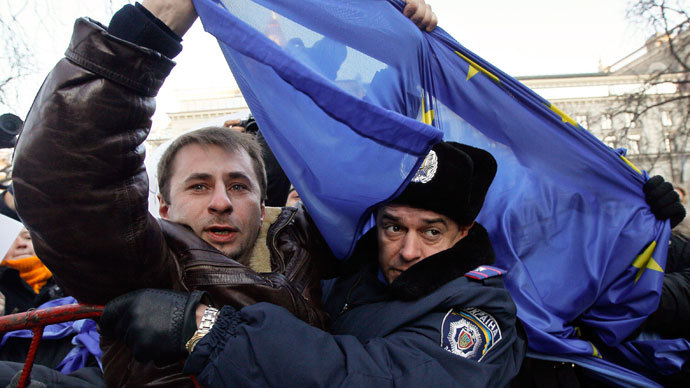Ukraine dodges 'EU death spiral'

The EU ‘horror show’ would not have offered Ukraine any financial benefits, geopolitical analyst William Engdahl told RT. He argues that multinational corporations just want to use Kiev to extract the resources of yet another European country.
RT:Ukraine's decision came as a surprise for many.
What triggered it?
William Engdahl: I think it’s a combination of things but
ultimately it was economic pressure from Moscow. I think that had
a lot to do with their decision where Ukrainian economic
interests truly lie. And perhaps some of the Ukrainian business
elites looked more closely at what the EU trade agreements would
require of them to sacrifice and realized that it wasn’t the
dream boat that they perhaps hoped for.
RT:Will they be able to strike a balance between
Moscow and Brussels?
WE: I think if they are clever, I suspect that the Ukrainian
political leadership has a delusional view of what the EU would
bring for the Ukrainian economy. Of course they long to be
accepted as a Western European nation, and so forth, since the
breakup of the Soviet Union but right now the EU is in a kind of
a death spiral with the false construct of the Eurozone. And the
austerity package that the IMF is bringing to the periphery –
Greece, Portugal, Spain, Italy and so forth – that is a
horrendous thing.
The EU has little now to offer Ukraine and if Ukrainian business,
political leaders were looking at the thing more realistically,
they would concentrate on building stronger bridges to the East.
Because the future of Europe, of Western Europe, not simply
Ukraine, the future of Western Europe in my view lies in Eurasia
in a sense of Russia, China, the Middle Eastern countries,
especially Iran.

RT:But nonetheless a lot of Ukrainians have the
aspirations to be part of the EU?
WE: Well delusions are in every society. What can I say?
You have a delusion that life would be better in the EU. Talk to
Polish people, talk to Hungarians, talk to many of the countries
who joined the EU, maybe even joined the Euro and realized it was
a horror show. It destroyed their domestic industry. The EU is a
construct of global multinationals and those global
multinationals want to cherry-pick what is useful out of the
Ukranian economy which has precious resources.
RT:Let’s talk about the main political tension at the
moment and Yuliya Tymoshenko. Some members of the parliament say
she could be freed to get medical treatment. What is her future
then?
WE: She is a very complex case, but I think she has been
made into a symbol, into a straw woman for Western and especially
the US State Department pressure on Ukraine to make concessions
towards the West and towards NATO. And at this point Ukraine has
rethought the entire NATO option the previous presidency was so
keen on and realized that it would not be the most sensible thing
for Ukraine and I agree with that.
But I think Yulia Tymoshenko became a symbol and it had little to
do with her actual activities. Her corruption with the gas deal
she made when she was in office is well documented. She was tied
in with mafia elements that made billions at the expense of
Ukrainians and also the Russians. I think she was made a symbol
for another agenda and that is to put pressure on Ukraine to make
concessions towards the West.
The statements, views and opinions expressed in this column are solely those of the author and do not necessarily represent those of RT.













